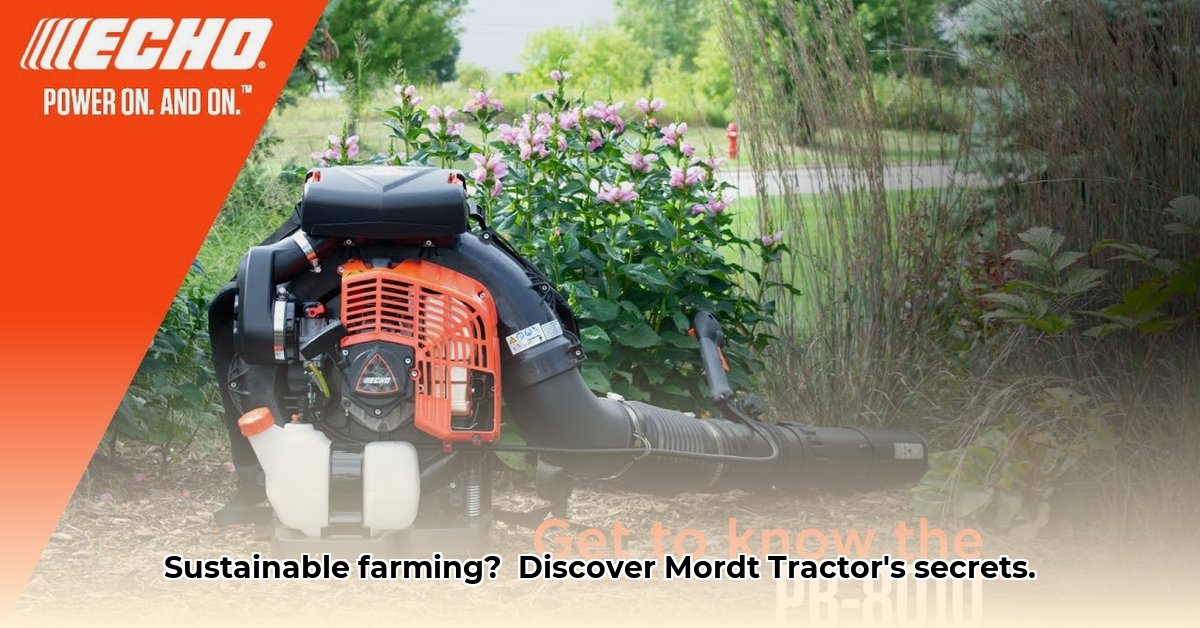
Mordt Tractor in Troy, Missouri, plays a significant role in the state's agricultural landscape, supplying farm equipment from leading brands like New Holland, Kubota, and Bush Hog. This positions them to influence the efficiency and sustainability of Missouri farming operations. However, a comprehensive assessment of their contribution to sustainable agriculture requires a deeper investigation beyond simply providing fuel-efficient machinery. This article analyzes Mordt Tractor's current practices and proposes actionable steps to enhance their sustainability impact. For more information on similar businesses, check out this local tractor supply.
Mordt Tractor's Influence on Sustainable Farming
Mordt Tractor's provision of modern, efficient farm equipment directly contributes to reduced fuel consumption and improved land use – two cornerstones of sustainable farming. However, their proactive engagement in environmental responsibility needs further examination. Critical questions remain regarding their promotion of lower-emission equipment, farmer training initiatives on eco-friendly techniques, and collaborations with sustainability-focused organizations. The absence of readily available data on these aspects currently limits a complete assessment of their overall environmental footprint.
Data Transparency and Future Opportunities
A significant challenge in evaluating Mordt Tractor's sustainability efforts is the limited publicly available information. To gain a comprehensive understanding, we need more data regarding their sales of various equipment types, including electric or hybrid models, their waste management practices, and employee training programs related to environmental responsibility. Such transparency is crucial for a thorough analysis of their contribution to sustainable agriculture.
A Multi-Stakeholder Approach to Sustainable Agriculture
Achieving sustainable agriculture requires a collaborative effort involving Mordt Tractor, Missouri farmers, and relevant governmental agencies. This necessitates transparency and open communication from all parties.
Actionable Steps for Enhanced Sustainability
Here's a framework for Mordt Tractor, farmers, and government agencies to strengthen sustainable agriculture practices in Missouri:
1. Mordt Tractor:
- Short-Term (1 year): Conduct a thorough audit of their current sustainability practices, honestly assessing their environmental impact. Publicly highlight their existing contributions to sustainable farming (e.g., through equipment efficiency) in their marketing materials.
- Long-Term (3-5 years): Develop and implement a comprehensive sustainability strategy encompassing partnerships with sustainability organizations, increased inventory of low-emission equipment, and a robust waste management system. Consider seeking relevant certifications to demonstrate their commitment.
2. Missouri Farmers:
- Short-Term: Evaluate existing equipment for efficiency and environmental impact. Explore equipment upgrades through Mordt Tractor to enhance sustainability.
- Long-Term: Integrate sustainable farming practices, like precision farming techniques or crop rotation, into their operations, utilizing efficient equipment from Mordt Tractor.
3. Government Agencies (e.g., Missouri Department of Agriculture):
- Short-Term: Engage with Mordt Tractor to understand their role in sustainable agriculture. Explore providing financial incentives (e.g., tax breaks or grants) for the adoption of environmentally friendly equipment.
- Long-Term: Develop policies supporting sustainable agricultural equipment by incentivizing businesses like Mordt Tractor to implement proactive environmental strategies. Establish clear guidelines and regulations to promote sustainability.
Choosing Sustainable Farming Equipment in Missouri
Mordt Tractor's extensive offerings present numerous choices for Missouri farmers aiming for sustainability. Selecting the right equipment involves careful consideration beyond the initial purchase cost.
Key Factors in Sustainable Equipment Selection
Farmers should prioritize the following when choosing sustainable farm equipment:
- Fuel Efficiency: Select equipment with lower fuel consumption, matching horsepower to actual needs to avoid waste.
- Emissions: Prioritize equipment meeting or exceeding environmental standards for minimized emissions.
- Durability and Longevity: Invest in high-quality, durable equipment to reduce the need for frequent replacements. Regular maintenance is crucial.
- Technological Advancements: Utilize precision farming tools (GPS-guided systems, variable-rate technology) to improve efficiency and reduce resource waste.
- Maintenance and Repair: Choose equipment with readily available parts and reliable local service (like that offered by Mordt Tractor) to minimize downtime.
Mordt Tractor's Role in a Sustainable Future
Mordt Tractor's extensive parts inventory and service network contribute significantly to equipment longevity and minimizing downtime. However, further transparency regarding the sustainability of the equipment itself (beyond service) is needed. Publicly sharing data on the environmental performance of their equipment would increase trust and empower informed decision-making by farmers.
Collaborative Steps Towards a Greener Future
A collaborative effort between Mordt Tractor and Missouri farmers can accelerate the adoption of sustainable practices. This includes:
- Mordt Tractor expanding its inventory of fuel-efficient and low-emission equipment.
- Mordt Tractor hosting educational workshops on selecting sustainable equipment and practices.
- Mordt Tractor fostering partnerships with suppliers committed to sustainable manufacturing.
- Mordt Tractor prioritizing data transparency regarding equipment’s environmental impact.
"Sustainable farming necessitates a holistic strategy; it's not solely about equipment but also about a fundamental shift in farming practices," says Dr. Emily Carter, Professor of Environmental Science at the University of Missouri. "Collaboration between all stakeholders is paramount to achieving a greener agricultural future."
By fostering open communication and transparency, Missouri can move towards a more sustainable agricultural landscape. This collaborative effort will benefit both the environment and the long-term prosperity of the state’s agriculture sector.